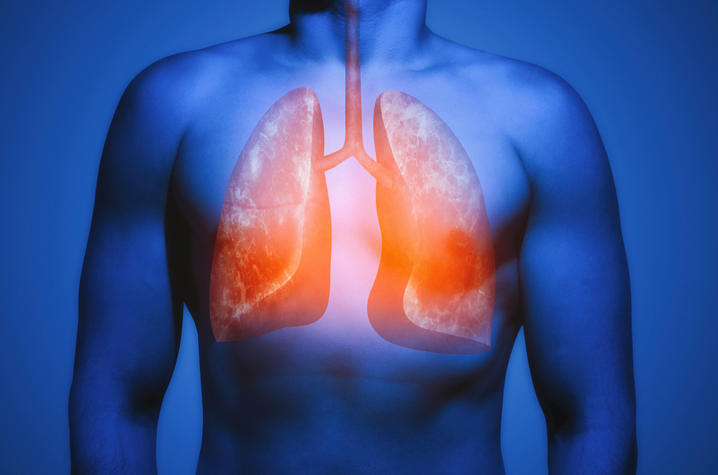UK Researcher Creates New Breath Test to Diagnose Lung Disease

LEXINGTON, Ky. (April 10, 2020) — As the worldwide coronavirus COVID-19 pandemic continues to play out, researchers are among those working to find innovative solutions to help flatten the curve.
One such researcher is Jamie Sturgill, assistant professor in the University of Kentucky College of Medicine Department of Internal Medicine. Sturgill's research focuses heavily on lung disease.
"One of the challenges of better understanding and diagnosing lung disease is being able to get tissue or a sample of the lung from a biopsy," Sturgill said. "Unlike going to a lab to take blood, a lung biopsy is an invasive procedure that you can't easily perform."
Sturgill has created a new way to find biomarkers for lung disease -- by testing a person's breath.
"This is completely non-invasive. A patient literally breaths into a tube, we collect the breath sample and then look for markers for inflammation," Sturgill said. "This can help to detect asthma, chronic obstructive pulmonary disease (COPD) and emphysema."
While this type of breath test is still in the research phase, Sturgill believes it could be effective in fighting COVID-19.
Because COVID-19 is a respiratory virus, patients need a test to confirm infection. Urine and blood tests are easy to perform, but they're not effective for this type of virus. It's important for the doctor to get a nose or lung test. One such test is called a bronchoalveolar lavage (BAL), most often used on critically ill patients. A bronchoscope with a measured amount of fluid is passed through the mouth or nose and into the airway in the lungs. That fluid is then released and re-collected for examination. However, this process can put health care workers at risk because it exposes them to aerosols, which can be released into the room during this test.
"Typically, there are at least five people who treat a hospitalized patient in the ICU -- the doctor, a fellow, a resident, a nurse and a respiratory therapist," Sturgill said. "COVID-19 has a roughly 3:1 infection rate. If each of these providers were infected with the disease, it's possible they could, in turn, infect as many as 15 others. This can happen simply by doing their job and treating a patient."
Using Sturgill's innovative breath test, a sample would instead be taken through a tube, eliminating the possibility for aerosol release. The tube condenses the breath, turning it into condensed water droplets. The sample is then taken to the lab to look for signs of virus and inflammation.
"This has a big epidemiologic impact," Sturgill said. "By using breath samples, you don't use aerosol at all, in fact, you can collect this sample right off the ventilator which is also easier on the patient and the care team."
Sturgill believes her research will help with early screening and detection for folks suffering from lung diseases in Kentucky, and she hopes it will continue to evolve, eventually being used as a possible method of testing for COVID-19.
As the state’s flagship, land-grant institution, the University of Kentucky exists to advance the Commonwealth. We do that by preparing the next generation of leaders — placing students at the heart of everything we do — and transforming the lives of Kentuckians through education, research and creative work, service and health care. We pride ourselves on being a catalyst for breakthroughs and a force for healing, a place where ingenuity unfolds. It's all made possible by our people — visionaries, disruptors and pioneers — who make up 200 academic programs, a $476.5 million research and development enterprise and a world-class medical center, all on one campus.




